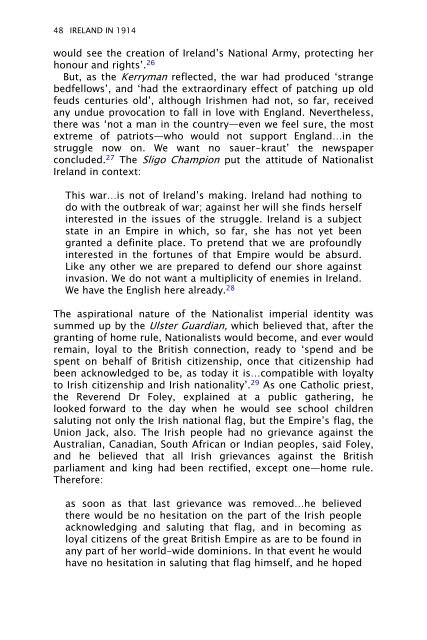Dividing Ireland: World War I and Partition
Dividing Ireland: World War I and Partition
Dividing Ireland: World War I and Partition
You also want an ePaper? Increase the reach of your titles
YUMPU automatically turns print PDFs into web optimized ePapers that Google loves.
48 IRELAND IN 1914<br />
would see the creation of <strong>Irel<strong>and</strong></strong>’s National Army, protecting her<br />
honour <strong>and</strong> rights’. 26<br />
But, as the Kerryman reflected, the war had produced ‘strange<br />
bedfellows’, <strong>and</strong> ‘had the extraordinary effect of patching up old<br />
feuds centuries old’, although Irishmen had not, so far, received<br />
any undue provocation to fall in love with Engl<strong>and</strong>. Nevertheless,<br />
there was ‘not a man in the country—even we feel sure, the most<br />
extreme of patriots—who would not support Engl<strong>and</strong>…in the<br />
struggle now on. We want no sauer-kraut’ the newspaper<br />
concluded. 27 The Sligo Champion put the attitude of Nationalist<br />
<strong>Irel<strong>and</strong></strong> in context:<br />
This war…is not of <strong>Irel<strong>and</strong></strong>’s making. <strong>Irel<strong>and</strong></strong> had nothing to<br />
do with the outbreak of war; against her will she finds herself<br />
interested in the issues of the struggle. <strong>Irel<strong>and</strong></strong> is a subject<br />
state in an Empire in which, so far, she has not yet been<br />
granted a definite place. To pretend that we are profoundly<br />
interested in the fortunes of that Empire would be absurd.<br />
Like any other we are prepared to defend our shore against<br />
invasion. We do not want a multiplicity of enemies in <strong>Irel<strong>and</strong></strong>.<br />
We have the English here already. 28<br />
The aspirational nature of the Nationalist imperial identity was<br />
summed up by the Ulster Guardian, which believed that, after the<br />
granting of home rule, Nationalists would become, <strong>and</strong> ever would<br />
remain, loyal to the British connection, ready to ‘spend <strong>and</strong> be<br />
spent on behalf of British citizenship, once that citizenship had<br />
been acknowledged to be, as today it is…compatible with loyalty<br />
to Irish citizenship <strong>and</strong> Irish nationality’. 29 As one Catholic priest,<br />
the Reverend Dr Foley, explained at a public gathering, he<br />
looked forward to the day when he would see school children<br />
saluting not only the Irish national flag, but the Empire’s flag, the<br />
Union Jack, also. The Irish people had no grievance against the<br />
Australian, Canadian, South African or Indian peoples, said Foley,<br />
<strong>and</strong> he believed that all Irish grievances against the British<br />
parliament <strong>and</strong> king had been rectified, except one—home rule.<br />
Therefore:<br />
as soon as that last grievance was removed…he believed<br />
there would be no hesitation on the part of the Irish people<br />
acknowledging <strong>and</strong> saluting that flag, <strong>and</strong> in becoming as<br />
loyal citizens of the great British Empire as are to be found in<br />
any part of her world-wide dominions. In that event he would<br />
have no hesitation in saluting that flag himself, <strong>and</strong> he hoped








